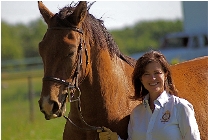So you've made a big decision. You are buying a horse!
Because the cost of a lawsuit is so steep, make sure your "horse transaction" is memorialized with a lawyer-prepared, well-written contract. The small contract prep charge will be a fraction of litigation expenses and heartbreak. If you cannot locate an equine attorney, an attorney specializing in contracts will work just fine. It always amazes me that written contracts are not demanded of every horse purchase or sale. Even on "small&qout; transactions...demand them in writing or do not do the "deal&qout;!
Full disclosure regarding your horse purchase is a necessity. Knowledge and verification of previous ownership, veterinary and show records will prove so helpful should problems occur. Your trusted trainer should readily agree with this requirement and should want to protect you, his valued client. It is your responsibility to make sure you complete your due diligence and have your equine prospect fully vetted.
The Bill of Sale is all-important. It is a legal document showing value, ownership (not the registration papers), and is the only document proving your ownership. Horses purchased overseas are covered by their country's laws, which may not stand up to adjudication in a US court. Ask your lawyer to review the sales agreement.
If breed registration papers exist, demand that you have them and make sure that request is noted in the Sales Agreement and Bill of Sale. Remember, those papers are needed for breeding and "breed-specific" horse shows. They are also proof of age.
Take your time and be thorough in your due diligence. Make sure all your paperwork is in order prior to transferring money and taking ownership.
Bridget Brandon is a Senior Certified Equine Appraiser with the American Society of Equine Appraisers and is USPAP Certified. Bridget has been a certified equine appraiser since 2001 and has worked on numerous equine related lawsuits as an appraiser, consultant and expert witness.
©Copyright - All Rights Reserved
DO NOT REPRODUCE WITHOUT WRITTEN PERMISSION BY AUTHOR.











